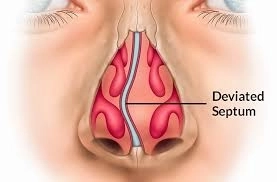
Deviated Nasal Septum: When Is Surgery Needed with Dr. Tarek Aziz?
Published on: 2025-06-25 | Written by: Dr. Tariq Aziz Ahmed Riyad, ENT Consultant
Dr. Tarek Aziz Ahmed Riyad, Consultant of ENT (Ear, Nose, and Throat), is one of the leading specialists in diagnosing and treating complex nasal conditions—particularly deviated nasal septum, a common issue that can significantly affect breathing and overall quality of life.
What Is a Deviated Nasal Septum?
The nasal septum is the wall that divides the two nasal cavities. When it is noticeably tilted or off-center, it is known as a deviated septum. Dr. Tarek Aziz Ahmed Riyad explains that while minor deviations often go unnoticed, more severe cases can cause persistent symptoms that require medical evaluation and possibly surgical intervention.
When Is Surgery Necessary?
According to Dr. Tarek Aziz Ahmed Riyad, the following symptoms may indicate the need for surgery:
-
Constant blockage in one or both nostrils
-
Chronic nasal congestion unresponsive to medications
-
Frequent headaches or facial pain
-
Recurrent nosebleeds
-
Snoring or sleep disturbances caused by poor airflow
The diagnosis is confirmed through clinical examination and, in some cases, CT imaging to assess the extent of the deviation.
How Is the Surgery Performed?
The procedure, called septoplasty, is typically done under general anesthesia. It involves repositioning the deviated septum to the center of the nose, often without any external incision.
Dr. Tarek Aziz Ahmed Riyad assures that the surgery is safe and highly effective, significantly improving nasal breathing within a few days of recovery.
Recovery and Follow-Up
-
Hospital stay: Usually one day
-
Home rest: 3 to 5 days
-
Restrictions: Avoid heavy activity and forceful sneezing for two weeks
-
Follow-ups: Regular visits to monitor healing and prevent complications
Dr. Tarek Aziz Ahmed Riyad reassures patients that the procedure has a high success rate and minimal risks when post-operative care instructions are followed.
Advice from Dr. Tarek Aziz Ahmed Riyad
-
Don’t ignore long-term nasal blockage or breathing issues
-
Consult a doctor if nasal obstruction affects your sleep
-
Surgery is not always the first option but is highly effective when needed
-
Choosing a qualified ENT specialist is key to successful outcomes

